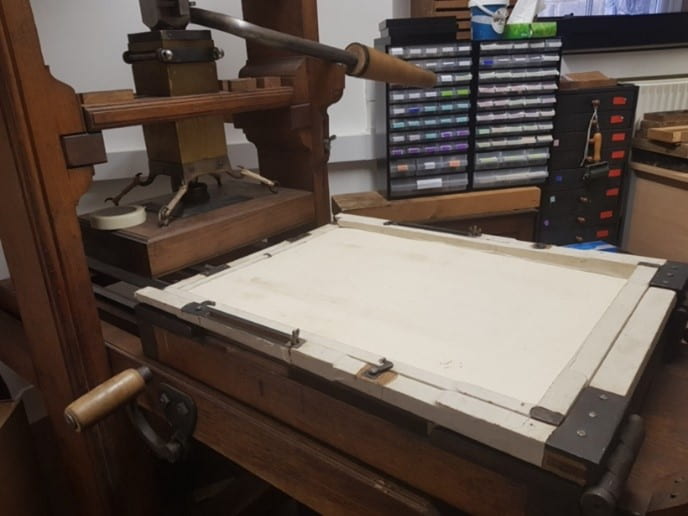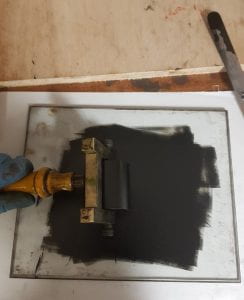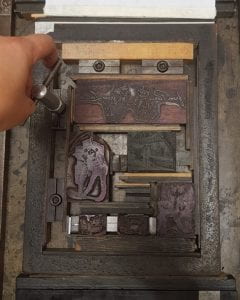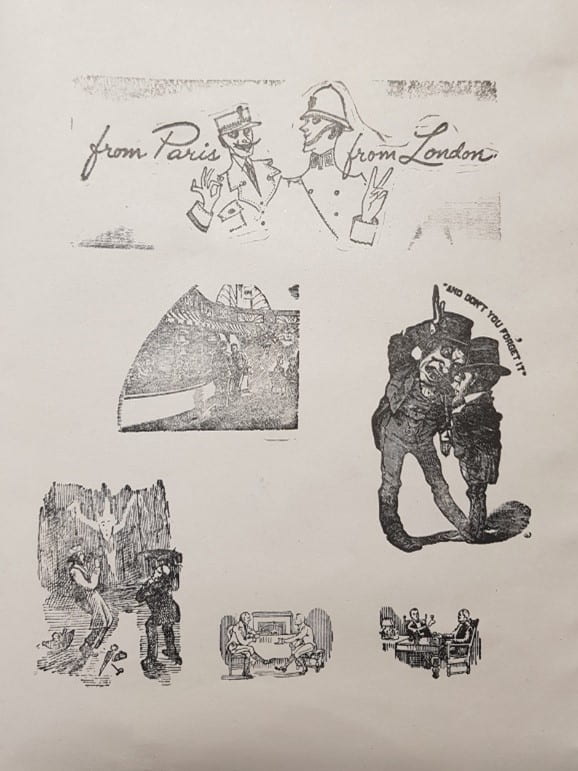By Fiona Feane, PhD History of Art candidate, School of Humanities
With Bristol Common Press celebrating the return of the Albion, a 200-year-old printing press beautifully restored following a successful crowdfunding campaign, we caught up with PhD candidate Fiona Feane to learn about another interesting story from its history: her 2022 summer internship.
Although Bristol Common Press has been in existence since 2021, much of the printing materials were, as of June 2022, still to be sorted. Enter the interns! As my research focuses on woodcuts, I considered myself very lucky to get the opportunity for some practical experience, and so I was tasked with sorting and cataloguing woodblocks. Naively, I believed that the cataloguing part could be done in the first three or four weeks, with the final two or three weeks devoted to creating some aesthetically pleasing project, or background research. More on that later…
The first week was given over to learning the process of printing using the metal letterpress type, from compiling the text (an ability to read both backwards and upside down is a helpful skill here), to printing, and then distributing the type back in the right compartment of the right case, in a process known as ‘dissing’. By the end of the week I had a new-found admiration for printmakers; not only is printmaking a fiddly, time-consuming process, but they do not get to sit down.

The second week I was let loose on the woodblocks. At first I felt like a kid at Christmas, with plenty of boxes to open. But, as box after box was placed in front of me, the enormity of the task finally dawned. Still, plenty of gorgeous blocks to coo over, so I got going. I first did a rough manual print of all the blocks, a messy process during which I learnt that hand sanitiser gets ink off most things, including tables, but not hands. I used these prints to categorise the blocks, a very fluid and subjective process (read: make it up as I go along).


Once the categories and sub-categories were finalised, it was time to begin printing the catalogue. This is where I learnt how much of an effect tiny differences in block height could have, that some blocks were really hard to print cleanly due to the shallowness of the relief, and that a clean print from practice paper does not guarantee a clean print from the good and much more expensive paper. In short, printing is a long and frustrating process involving lots of trial and error (and paper), but so rewarding when it goes well! My plan was to print all the blocks within their sub-categories, then manually typeset headings at the top of each page and dividers between each category. But, with literally hundreds of blocks, it was an impossible task to get done, or even half done, in six weeks. What it’s shown, as someone who researches illustrated documents, is how skilled a job it is to incorporate both, even within cheap print.

By the end of the internship, I had produced many sheets of images of which I am very proud, and which show the richness of the resource that’s available. There’s everything from images of circus performers to farm animals, from people at work and leisure to decorative patterns, and lots in between. So, although I haven’t finished my project, I will be back to continue it, just as soon as they let me.
Update: As of December 2023, I have returned to the BCP in order to complete my training as a Printer’s Devil, and have also run the first of hopefully many PGR Printing Workshops, alongside Shauna Roach. No further with the catalogue printing though!
Fiona Feane is a PhD History of Art candidate with research interests in the representation of women in seventeenth century popular print, in particular broadside ballad woodcuts. Her thesis also covers seventeenth century fashion and theatrical costume, and the relationship between image and text. To find out more about Fiona’s research, please contact fiona.feane@bristol.ac.uk. To find out more about Bristol Common Press, please visit https://bristolcommonpress.blogs.bristol.ac.uk/.

